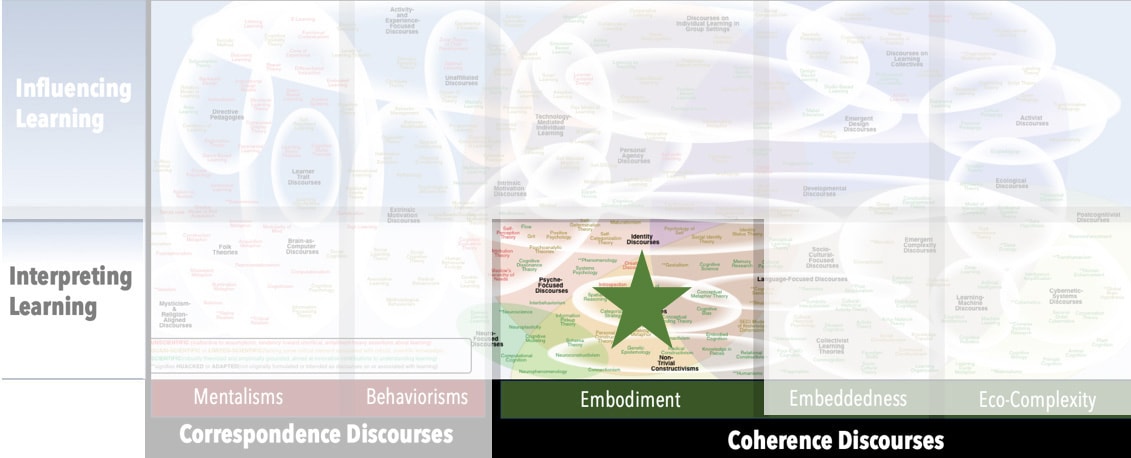Focus
Personal sense-making/understanding/knowingPrincipal Metaphors
- Knowledge is … sum of collectively established construals/constructs
- Knowing is … evolving webs of coherent interpretations; fitness with circumstances
- Learner is … a meaning maker (individual)
- Learning is … construing*, adapting, connecting, interpreting, weaving
- Teaching is … occasioning, prompting, triggering, listening
Originated
1980sSynopsis
Radical Constructivism starts with the recognition that knowledge is not a “thing” that can be shunted into a mind (from another mind, a text, etc.). Rather, it focuses on personal knowing – that is, the ongoing, iterative dynamic by which individuals construe coherent sense from their personal perceptions and experiences. Concisely, learning is a continuous process of revising concepts to maintain personal coherence in the face of new experiences/demands. The main criterion for personal truth is thus not match with external reality, but fitness with other, malleable personal truths. Within Radical Constructivism, the active body is seen as an integral component of the knowing system, as opposed to a container for the mind or an impediment to “taking in” information.Commentary
Radical Constructivism is sometimes accused of denying or ignoring social dynamics (e.g., conversation), cultural tools (e.g., language), and grander contexts (e.g., the “world”) in channeling and constraining interpretive possibilities. That criticism is overstated. Such elements are not ignored, but neither is the theory concerned with explaining them. Rather, Radical Constructivism focuses strictly on the complex dynamics of personal sense-making. It is thus not uncommon for educationists to blend or complement Radical Constructivism with other theories of learning that look at grander dynamics (e.g., sociocultural theories), although such blends are sometimes problematic. These discourses include:- Social Constructivism – Aligned with Non-Trivial Constructivisms, Social Constructivism gives particular attention to interactions with others. Those interactions are seen as integral to understanding personal construals and development.
- Cultural Constructivism – Blending themes of Radical Constructivism and Socio-Cultural Theory, Cultural Constructivism simultaneously confirms the subjective nature of personal knowing and the social and cultural contexts of knowledge, in the process highlighting the inextricability of individuality and collectivity in higher mental functions and other developmental phenomena. Examples include:
- Contextual Constructivism (William Cobern, 1990s) – a Socio-Cultural Theory that embraces the dynamics and foci of Radical Constructivism while layering in emphases on cultural frame and situational influence.
- Critical Constructivism – Extending Cultural Constructivism and aligning with Activist Discourses, Critical Constructivism seeks to promote more powerful and engaging learning settings while foregrounding often-invisible rules of collective action. It thus positions formal education as both an institution for the maintenance of knowledge and as a site of cultural reform.
Authors and/or Prominent Influences
Jean Piaget; Barbel Inhelder; Jerome Bruner; Ernst von GlasersfeldStatus as a Theory of Learning
Radical Constructivism is theory of learning.Status as a Theory of Teaching
Radical Constructivism is not a theory of teaching. An explicit tenet of Radical Constructivism is that the theory cannot prescribe teacher action, because there is no cause–effect relationship between a teacher’s actions and a learner’s construals. That said, Radical Constructivism does offer some useful advice, including cautioning educators against imagining a hearer will interpret what is said/done in precisely the manner intended or interpreted by the sayer/doer. Consequently, it is advised that learners have opportunity to express their interpretations and explore and experiment on their worlds (both physically and verbally) – all grounded on the realization that the most important element in shaping what one learns is what one already knows. Several theories of teaching are founded on notions that are consistent with Radical Constructivism, including Problem-Based Learning and Inquiry-Based Learning.Status as a Scientific Theory
Radical Constructivism is explicit about its grounding assumptions, and it is associated with a substantial base of empirical evidence.Subdiscourses:
- Contextual Constructivism
- Critical Constructivism
- Cultural Constructivism
Map Location

Please cite this article as:
Davis, B., & Francis, K. (2023). “Radical Constructivism” in Discourses on Learning in Education. https://learningdiscourses.com.
⇦ Back to Map
⇦ Back to List
